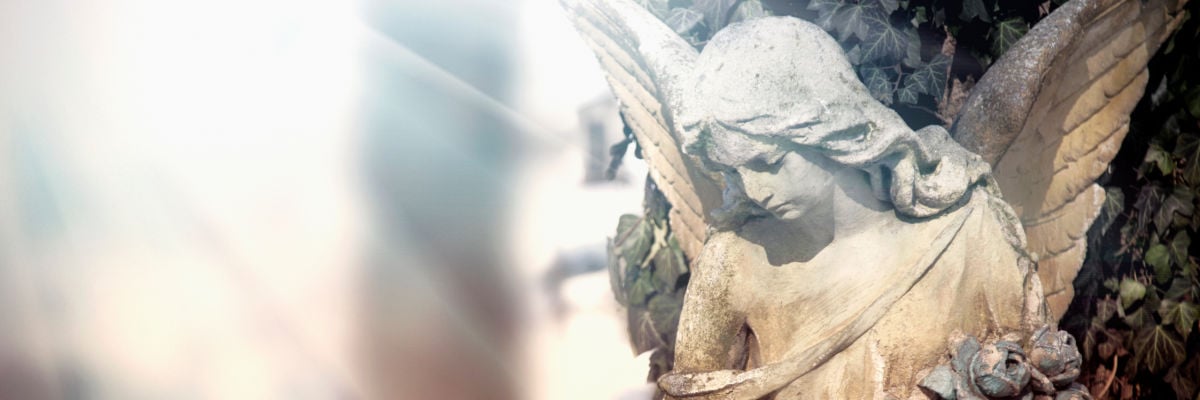
Guardian angel is a modern term, and it would strike biblical audiences as rather surprising.
The term angel (Hebrew, mal’ak; Greek, angelos) means messenger, and a messenger and a guardian are different. Talking about guardian angels—guardian messengers—would be a little like talking about dentist messengers or accountant messengers.
St. Augustine famously writes:
The angels are spirits. When they are simply spirits, they are not angels, but when they are sent, they become angels; for “angel” is the name of a function, not of a nature. If you inquire about the nature of such beings, you find that they are spirits; if you ask what their office is, the answer is that they are angels. . . . Make a comparison with human affairs. The name of someone’s nature is “human being,” the name of his job is “soldier.” . . . Similarly some beings existed who were created by God as spirits, but he makes them angels by sending them to announce what he has ordered them (Expositions of the Psalms 103:1:15).
The Bible uses other terms for non-human spirits that aren’t functioning as messengers. Sometimes high-ranking ones are called “sons of God” (Hebrew, bney Elohim) or “princes” (Hebrew, sarim)—as opposed to low-ranking spirits who run errands and deliver messages.
However, since low-ranking spirits have contact with humans, we encountered messengers frequently, and during the Christian age the term angel started being applied to every non-human spirit other than God.
When do we first hear about guardian angels? Immediately after the fall of man, we read:
He drove out the man, and at the east of the garden of Eden he placed the cherubim and a flaming sword that turned every way to guard the way to the tree of life (Gen. 3:24).
Today these beings would be classified as angels, but notice that the word isn’t used. They’re not delivering messages, and so they’re called cherubim. (Also, cherubs weren’t little babies with wings—those are known in Italian as putti. Cherubim were depicted as frightening animal-human hybrids; see Ezek. 10.)
Together with the flaming sword, these cherubim serve as the first angelic guardians in the Bible. But they’re not guarding humans. They’re guarding “the way to the tree of life.”
When is the first time we see angels guarding a human? In the story of Lot, God sends messengers (using the term “angel”) to warn him and his family of the destruction of Sodom (Gen. 19:12-22). When he delays leaving, they even grab him and force him out of the city!
We thus see angels being assigned to guard human beings. However, this is a temporary assignment of these angels—not a regular duty.
When is the first mention of angelic beings assigned to regularly guard humans? In the song of Moses, we read this:
Remember the days of old; consider the years of many generations; ask your father, and he will show you, your elders, and they will tell you. When the Most High gave to the nations their inheritance, when he divided mankind, he fixed the borders of the peoples according to the number of the sons of God. But the Lord’s portion is his people, Jacob his allotted heritage (Deut. 32:7-9).
What does the text mean when it says God divided mankind and fixed the nations’ borders “according to the number of the sons of God”?
“The sons of God” were high-ranking spirits that today would be called angels, and the idea was that God allotted the different nations to the care and command of these angelic beings—except Israel. He kept Israel as “his people.”
We thus see angelic guardians assigned to guard groups of people—nations—but not yet individuals.
The same guardians appear in the book of Daniel. Here they are called “princes” or “commanders” (sarim can be translated either way).
Daniel fasts and prays, and three weeks later, Gabriel shows up. He explains the delay by saying that “the prince of the kingdom of Persia” detained him, but Michael—“one of the chief princes” (10:13)—assisted him.
Gabriel also says he and Michael will fight the prince of Persia, making way for the prince of Greece to become prominent (vv. 20-21).
This heavenly conflict indicates that some “sons of God” are opposing God’s will. Today we would call such beings demons, and this was the common biblical understanding of who the gods of foreign people were—their guardian angels who went bad.
Michael is later described as “the great prince who has charge of your people” (12:1), indicating God has now incorporated Michael in the governorship of Israel.
The first time we read about angels regularly guarding individual humans is in Matthew. Discussing discipline within the Church, Jesus says:
See that you do not despise one of these little ones. For I tell you that in heaven their angels always see the face of my Father who is in heaven (18:10).
“These little ones” appear to be Christians (not children), so there is a link between Christians and angels who guard them.
Jesus says these angels “always see the face of my Father who is in heaven”—meaning that they have unlimited access to God’s throne room. If something bad is happening with one of their charges, they are guaranteed the ability to intercede with God.
Scripture doesn’t give us much more information about angelic guardians. But that hasn’t stopped Christians from wondering about them.
Based on the passage in Matthew, they have wondered if only Christians have guardian angels or whether all humans do. The Catechism is ambiguous, saying that God surrounds “human life” with angels and that “each believer” has an angel (336).
People have also wondered—on the theory that only Christians might have guardian angels—whether we gain them at baptism or birth.
St. Thomas Aquinas favored the view that all human beings get guardian angels at birth (ST I:113:5). Today we might push this back to conception, and the Catechism circumspectly says that human life has the care of angels “from its beginning until death” (ibid.).
Do some people get extra guardian angels? Like those who become priests or get married and need grace for their vocation?
Scripture indicates that—in a general way—people may have more than one angel looking out for them. An ancient Israelite had Michael as national patron—plus his own individual guardian angel. Today Michael is regarded as the patron of the Church, yet Christians also have individual guardians. And we saw from Lot’s case that additional guardians could be assigned as needed.
However, we have no biblical evidence of God regularly assigning extra angels to people in states like the priesthood or marriage.
What about the reverse? Could a single angel guard more than one person—the way a shepherd guards a flock of sheep? Jesus’ statement in Matthew doesn’t rule this out. In speaking of “these little ones,” he says, “their angels,” but he doesn’t say each person has uniquely one angel. Further, Israel is still God’s people, and unless Michael has abandoned his former charge for the Church, he may well be guarding two groups of God’s people.
Like everything in this area, this is a matter of speculation, and we ultimately can’t know. What we can know is that we are protected by angelic guardians and that God will never let us lack protection. Regardless of the mechanics of how it works out in the invisible world, the amount of protection we need is the amount we will have.



